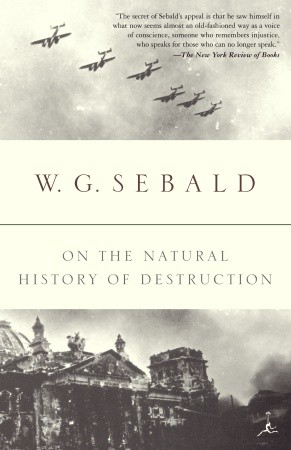
On the Natural History of Destruction
کتاب های مرتبط
- اطلاعات
- نقد و بررسی
- دیدگاه کاربران
نقد و بررسی

December 16, 2002
Shortly before his untimely death last year, Sebald had published to great acclaim Austerlitz,
the NBCC Prize–winning fourth of his novel-memoirs that appeared in rapid succession. Now comes this slim collection of four essays addressing the same themes that preoccupied Sebald in Austerlitz
and his other major works—memory and survival in an era marked by so much wanton cruelty. The four essays gathered here find Sebald turning his luminous intelligence and rich, sometimes caustic prose on major figures of postwar German literature. Sebald can be a devastating critic: he dislikes melodrama and falsehood, is inspired by crisp, serious prose and veracity. In essays on Alfred Andersch, Jean Améry and Peter Weiss, Sebald suggests that great writing is underpinned by moral fortitude. In "Air War and Literature," Sebald criticizes the silence of postwar German literature on the starvation, mutilations and killings caused by Allied bombings. The essay provoked a major controversy when it appeared in Germany in 1999. Some commentators were dismayed that Sebald chose to revisit those difficult times and to attack, with his full ironic and sardonic powers, a number of revered figures in German literature. Sebald was dismayed that his comments provoked an outpouring of support from those who could talk only about German suffering and Jewish conspiracies. But only at the very end, almost as an afterthought, does Sebald place this suffering in historical context, as the consequence of German policies of total war and the Holocaust. "Air War and Literature" is an important but flawed effort by a writer who always demanded unflinching engagement with the past. B&w photos.

October 1, 2002
Sebald's final work, which roused many Germans to anger, investigates the consequences of the huge civilian loss Germany endured during World War II.
Copyright 2002 Library Journal, LLC Used with permission.

December 15, 2002
Much has been written about the Allied bombing of Germany during World War II, often focusing on the resilient, rubble-picking survivors or the questionable ethics of leveling Dresden. This book focuses upon the air war's lingering fallout for the German psyche, particularly the awkward silence of German writers on the subject of their nation's destruction. Postwar German writing, Sebald argues, is "looking and looking away at the same time" as writers struggle with their nation's guilt and victimhood, but also with the destruction of their own authority as writers in a morally discredited society. The author explores, among others, novelist Alfred Andersch's egotistical apologies and confessions and Peter Weiss' attempt to "attain absolution in heroic, self-destroying work." Himself a German writer and prolific literary scholar, Sebald approaches his subject with sensitivity, yet avoids neither descriptions of horrible carnage nor criticism of writers too preoccupied with absolving themselves of blame to faithfully portray a destroyed Germany. The result is a balanced explication of devastation and denial, and a beautiful coda for Sebald, who passed away in December 2001.(Reprinted with permission of Booklist, copyright 2002, American Library Association.)

























دیدگاه کاربران